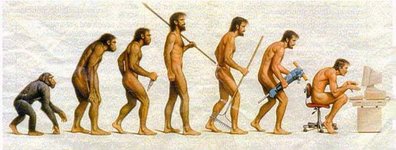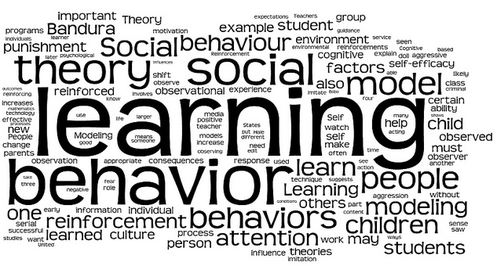Evolution
Evolution helps describe the beginning of man, but also the ongoing changes that model our lives.
Evolution of the Mind:
Charles Darwin's publication, On the Origin of Species, introduced the scientific theory that populations evolve through generations by means of natural selection. Although this book was published 150 years ago, people are still skeptical of Darwin's discoveries, believing that, although the evolution theory is true, there must be a higher power that assists with the advancing of man. Mainly, people question the mind-brain problem. NPR's Jon Hamilton tells of this problem and what the Darwin skeptics consider: "How can the brain, which is just a bunch of cells, produce things like consciousness, subjective experience and free will? And how can these things be the result of evolution?"
Charles Darwin's publication, On the Origin of Species, introduced the scientific theory that populations evolve through generations by means of natural selection. Although this book was published 150 years ago, people are still skeptical of Darwin's discoveries, believing that, although the evolution theory is true, there must be a higher power that assists with the advancing of man. Mainly, people question the mind-brain problem. NPR's Jon Hamilton tells of this problem and what the Darwin skeptics consider: "How can the brain, which is just a bunch of cells, produce things like consciousness, subjective experience and free will? And how can these things be the result of evolution?"
Evolution of Social Learning:
Mark V. Flinn, professor in the University of Missouri, writes about different theories and their influence on evolution of culture in Culture and the Evolution of Social Learning. In his publication, he states that dual-inheritance and co-evolution theories prove that the evolutionary process involves two different inheritance systems: genetics and social learning. The debate regarding which of the two systems are more influential stems from the broader Nature vs Nurture debate. Evolutionary psychology theories emphasize that the evolutionary history of natural selection on mental processes shows a linkage between culture and biological adaptation. Therefore, cultural information is viewed as organic physical characteristics, not as an independent evolutionary system. Behavioral ecology theories examine relations between behavior and environmental context. Behavioral and cultural variations are viewed as products of flexible decision-making processes. The ability to make decisions shows how evolved the human mind is. Mark Flinn also states that it is difficult to conduct distinct experiments to test these theories because they share many basic hypotheses about human behavior. Social learning is the key process underlying these evolutionary patterns, which demonstrate that genetics and social learning are the basis to the evolutionary process of culture. Mark Finn also argues in his publication that “human learning mechanisms are products of natural selection, and hence process information in ways that reflect evolutionary design. I review common objections to this hypothesis, including (1) learning processes are uncoupled from genetics and biological adaptation; (2) culture (or its effects) is partly extrasomatic; (3) culture, by most definitions, involves mental phenomena, including conscious thought; (4) culture involves the use of arbitrary symbols to communicate information; (5) culture appears to have emergent properties at the group level, such as shared values and beliefs resulting in political and religious institutions; (6) culture involves historical processes; and (7) complex culture is uniquely human—we need an explanation for why the human species alone evolved such extensive social learning aptitudes. I suggest that these controversies can be resolved, although empirical tests are difficult.”
Mark V. Flinn, professor in the University of Missouri, writes about different theories and their influence on evolution of culture in Culture and the Evolution of Social Learning. In his publication, he states that dual-inheritance and co-evolution theories prove that the evolutionary process involves two different inheritance systems: genetics and social learning. The debate regarding which of the two systems are more influential stems from the broader Nature vs Nurture debate. Evolutionary psychology theories emphasize that the evolutionary history of natural selection on mental processes shows a linkage between culture and biological adaptation. Therefore, cultural information is viewed as organic physical characteristics, not as an independent evolutionary system. Behavioral ecology theories examine relations between behavior and environmental context. Behavioral and cultural variations are viewed as products of flexible decision-making processes. The ability to make decisions shows how evolved the human mind is. Mark Flinn also states that it is difficult to conduct distinct experiments to test these theories because they share many basic hypotheses about human behavior. Social learning is the key process underlying these evolutionary patterns, which demonstrate that genetics and social learning are the basis to the evolutionary process of culture. Mark Finn also argues in his publication that “human learning mechanisms are products of natural selection, and hence process information in ways that reflect evolutionary design. I review common objections to this hypothesis, including (1) learning processes are uncoupled from genetics and biological adaptation; (2) culture (or its effects) is partly extrasomatic; (3) culture, by most definitions, involves mental phenomena, including conscious thought; (4) culture involves the use of arbitrary symbols to communicate information; (5) culture appears to have emergent properties at the group level, such as shared values and beliefs resulting in political and religious institutions; (6) culture involves historical processes; and (7) complex culture is uniquely human—we need an explanation for why the human species alone evolved such extensive social learning aptitudes. I suggest that these controversies can be resolved, although empirical tests are difficult.”
Evolution

Evolution is the gradual change of organisms over time. The theory states that inherited traits are passed on from one generation to the next. Evolution may occur when there is variation of inherited traits within a population, such as a mutation, genetic recombination, and gene flow. Evolution has led to the diversity of all living organisms from a common ancestor. There are four common mechanisms of evolution: natural selection, genetic drift, mutation, and gene flow. Natural selection is a process in which reproduction of organisms differ in one or more inherited traits from their parents. Genetic drift is a process that causes random changes in two or more inherited traits within a population. Mutation is when a permanent change in a DNA sequence occurs. Gene flow is the incorporation of genes from one population into another.
Sources:
-Human Mind Picture:kejda.net
-Social Learning Picture:-Flinn, Mark V. "Culture and the Evolution Term of Social Learning." Evolution and Human Behavior. Vol. 18. Elsevier Science, 1997. 23-67. ScienceDirect.
Web. 22 Apr. 2011. <http://www.sciencedirect.com/science>
-http://www.truthtree.com/images/evolution_of_man.jpg
-Human Mind Picture:kejda.net
-Social Learning Picture:-Flinn, Mark V. "Culture and the Evolution Term of Social Learning." Evolution and Human Behavior. Vol. 18. Elsevier Science, 1997. 23-67. ScienceDirect.
Web. 22 Apr. 2011. <http://www.sciencedirect.com/science>
-http://www.truthtree.com/images/evolution_of_man.jpg


